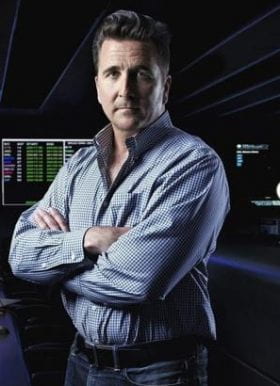Science & Technology

James Boyle
On February 29, 2012 James Boyle, the William Neal Reynolds Professor of Law and co-founder of the Center for the Study of the Public Domain at Duke Law School talked about "Cultural Agoraphobia: Why Most of What You Know About the Internet is Wrong."

Radiolab
On February 26, 4:30 p.m. in Graham Chapel, Radiolab hosts Jad Abumrad and Robert Krulwich talked about "Celebrating Curiosity - Celebrating Arts & Sciences."

Holden Thorp, Gil Eyal, Tess Lanzarotta, Damon Scott Tweedy and Yolonda Y. Wilson
A panel of leading academics discussed “Gatekeeping & the Publishing Landscape for Scholarship on Race, Medicine & Science.”

Moogega Cooper
NASA’s Moogega Cooper delivered the keynote address at the 2021 She Leads Symposium, hosted by the Spencer T. and Ann W. Olin Fellowship for Women in Graduate Study at Washington University in St. Louis.

Drew Shindell
Shindell discussed the health, labor and agriculture benefits of climate change mitigation in the U.S. An expert on climate science and policy, he has testified on these issues before both houses of Congress, at the request of both parties, and has authored more than 250 peer-reviewed publications.

Gregory Radick
Nearly everyone is familiar with Darwin’s famous theory of natural selection detailed in his 1859 masterpiece, “On the Origin of Species.” Perhaps not so commonly known is his theory on the universality of race, presented in the 1872 publication of “The Expression of the Emotions in Man and Animals.”

Jonathan Losos
As founding director of the Living Earth Collaborative, Losos seeks to marshal the might of three world-class organizations – the Missouri Botanical Gardens, the Saint Louis Zoo and Washington University, where he is the William H. Danforth Distinguished University Professor in Biology – into a collaboration that transcends geographic and political boundaries to conserve biodiversity and sustain life on Earth.

Jeffrey Bonner
Bonner has been president and CEO of the Saint Louis Zoo since 2002; in 2009 he became the Dana Brown President and Chief Executive Officer.

William McKinnon
McKinnon’s long career as a planetary scientist has been marked by a series of exciting discoveries and new explorations. But perhaps the most thrilling feat he has witnessed to date occurred July 14, 2015 when NASA’s New Horizons spacecraft flew through the Pluto system, capturing extraordinary images and other data that illuminated the complex geological world of the farthest planet in the classical solar system.

Sarah Kliff
Kliff is a senior policy correspondent at Vox.com is an award-winning journalist and one of the country’s leading health policy experts.

Becca Lewis
Lewis is a doctoral student in communications at Stanford University and works at Data & Society, a research institute studying the social and cultural issues arising from data-centric technological development.

Anna Banchik
Banchik currently is completing her doctorate at the University of Texas-Austin. Her research interests focus on human rights fact-finding and advocacy, expertise, and visual culture.

Joel Sartore
Joel Sartore is a man on a mission, and he’s running out of time. Like Noah, he’s obsessed with building an ark – the Photo Ark — a groundbreaking effort to document species before they disappear, and to get people to care while there’s still time.

Adam Steltzner
Adam Steltzner, in charge of the Entry, Decent, and Landing of NASA's Mars rover Curiosity, outlined the winding journey of his life in his Assembly Series lecture on March 26, 2015: “How Curiosity Changed My Life.” The lecture title was a deliberate play on words meant to emphasize the power of intellectual curiosity and how it can transform a life.

Michael Barbaro
The proliferation and popularity of podcasts — especially among millennials — have created many new media stars, but few are shining as brightly as Barbaro, the host of The Daily, the New York Times’ entry into the podisphere with millions of devoted listeners. It was the most-downloaded new show on Apple Podcasts last year, with five million listeners a month at last count, and will more than one million tuning in each day.

Elisabeth Lloyd
Evolutionary biologist and historian of science Elisabeth Lloyd is author of The Case of the Female Orgasm: Bias in the Science of Evolution.

Eric Kandel
On October 28, 2014 at 5 p.m. in Graham Chapel, Nobel Laureate Eric Kandel talked about "The Age of Insight: The Quest to Understand the Unconscious in Art, Mind and Brain from Vienna 1900 to the Present."

Humberto Gonzalez, Meredith Malone, Neil Richards: Panel on Drones in Society
Three WashU experts explore how drone technology is changing our world in a discussion that promises to bring intriguing insights. “Technology, Ethics, and Laws” featuring Humberto Gonzalez, Neil Richards, and Meredith Malone, at 5:30 p.m. March 31 in Steinberg Auditorium. At 5 p.m. please join us for a reception and viewing of the exhibition on which the discussion will be based: “To See Without Being Seen: Contemporary Art and Drone Warfare,” in the Kemper Art Museum.

Mike Parker Pearson
British archaeologist Mike Parker Pearson and his research team had unprecedented access to Stonehenge and its surroundings, and his research findings are replacing centuries of speculation with facts. He will share them at an Assembly Series program at 4 p.m. Wednesday, March 27, in Steinberg Hall Auditorium.

Robert Sussman
“The anthropological concept of culture is extremely important and often misunderstood because many of the things that are assumed to be biologically determined, like criminality or homosexuality or IQ, are really behaviorally and societally defined.” This quote from Robert W. Sussman, PhD, professor of physical anthropology in Arts & Sciences at Washington University, forms the basis for his Phi Beta Kappa/Sigma Xi Lecture. “The Importance of the Concept of Culture to Science and Society,” part of the university’s Assembly Series, will be held at 4 p.m. Tuesday, April 9, in Steinberg Hall Auditorium.